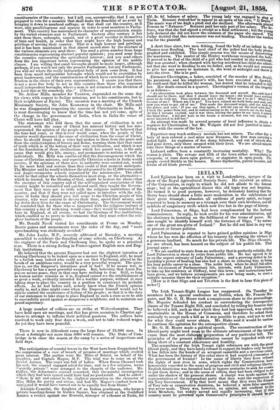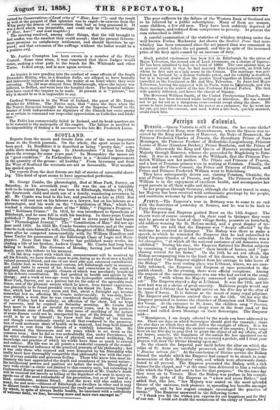IRELAND.
Lord Eglinton has been on a visit to Londonderry, cipropos of the show of the Royal Agricultural Society there. He received an address of the Corporation, in reply to which he did not allude to the famous siege ; but at the agricultural dinner this old topic was not forgotten. He turned it to good purpose, however, by delicately hinting that the Derry boys should show a little more moderation in the celebrations of their great triumph ; abandon all emblems of party spirit, no longer required to keep in memory as a triumph over their own brethren, and all symbols of sanguinary strife which now live but in the page of history.
Lord Palmerston, at Sligo, had been complimented by the harbour commissioners. In reply, he took credit for his war administration, and his obstinacy in insisting on the fulfilment of the terms of peace. He also sought to identify himself with the fortunes of Sligo "by nature one of the great sea-ports of Ireland." But he did not MA in any way at present or future polities.
Lord Palmerston is reputed to have gained golden opinions in Sligo where he has won the affection of his tenanty by showing the virtues of a generous landlord. So much for his private life. The Sligo Chroniek, we are afraid, has been hoaxed on the subject of his public life. That journal says- " We are enabled testate from an authority that is perfectly reliable, that Lord Palmerston is about to retire from public life. He has agreed to do so on the urgent entreaty of Lady Palmerston; and a growing defect in his Lordship's power of hearing has also had a share in inducing him to bring his long public career to a close. The noble lord, when he shall bid adieu to the excitement of Parliamentary life, intends, with Lady Palmerston, to take up his residence at Cliffony, near this town; and instructions have been given, and we believe arrangements are now being made, to erect a suitable mansion there for their reception." [How is it that Sligo and not Tiverton is the first to hear this piece of news ?]
The Irish Tenant-Right League has reappeared. On Tuesday itg members held a special conference at Dublin, when Mr. Francis Ma- guire, and Mr. G. H. Moore took a conspicuous share in the proceedings. Mr. Maguire defended his conduct in surrendering the retrospective clause of the Tenant-Right Bill, and concluded by telling his hearers that he believed a bill, such as that which they had last approved, was utterly unattainable in the House of Commons, and therefore he asked them seriously to accept such a bill as it was possible to pass, and not to wait for what they could never obtain. Mr. Blake said it would be useless to continue the agitation for the retrospective clause.
Mr. G. H. Moore made a political speech. The reconstruction of the liberal party might tend more to the ultimate advancement of the tenant cause than the most elaberete treparation of any particular bill. The principles of the present addtinistration cannot be regarded with any- thing short of a constant abhorrence and hostility. The sympathies of the Irish Tenant right reformers are with the great liberal party, and they have lately refused to support its leaders only because it has fallen into the 'lands of an arrogant camarilla and a covetous cabal. What has been the history of this cabal since it had acquired Fossession of the government of Ireland ? In the name of liberty they have refused the rights of men even in arms, which rights the Conservatives have honourably conceded in the name of progress and civil and religious liberty. English fanaticism was hounded back to bygone centuries to seek for causes to put them down' and in the name of reform they had been obliged to sit under the shadow of the grossest abuses. A charge was made against the representatives of the independent party that they were the supporters et the Tory Government. If by that were meant that they were the friends of Tory rule or conservative dominion, he believed a more false assertion was never made. There was, however, an opinion, not confined to the Irish Members, but widely spread and rapidly increasing, that if this country must be governed upon Conservative principles it should be go'
vented by Conservatives--(Loud cries of "Hear, hear !")—and the result as well as the purport of that opionion was to expel—to exorcise from the whig party the demon of conservatism that had so long possessed it. It was a devil which was inexorable, and could only be reduced by fastings. (" Hear, hear!" and loud laughter.) The meeting resolved, among other things, that the bill brought in last session was the smallest they could accept ; that the present Govern- ment promises no satisfactory settlement, and should therefore be op- posed; and that extension of the suffrage without the ballot would be a a positive evil.
Mr. Justice Crampton has been sworn in a member of the Privy Council. Some time since, it was rumoured that three Judges would retire, making a clear path to the bench for Mr. Whiteside and other Tories. It died away, and is now again revived.
An inquiry is now pending into the conduct of some officers of the South Downshire Militia, who, in a drunken frolic, are alleged to have brutally and indecently injured an old man, the waiter at an hotel where they were carousing. The old man strayed from Hillsborough, where the injury was inflicted, to Belfast, and went into the hospital there. The hospital author- ities have caused the inquiry to be made. At present it is "private," but why it should be so it is impossible to say.
Cardinal Wiseman is in the West of Ireland, the guest of Mr. Ennis, Member for Athlone. The Nation says, that "since the days when the the Nuncio Rinuccini brought the benison of the Supreme Pontiff to the banner of Irish independence no dignitary of the Church has come among us so certain to command our respectful appreciation as Catholics and Irish- men."
The Tablet has commercially failed in Ireland, and its head-quarters are to be restored to the metropolis of the empire. The failure is ascribed to the impossibility of finding a fit successor to the late Mr. Frederick Lucas.



























 Previous page
Previous page